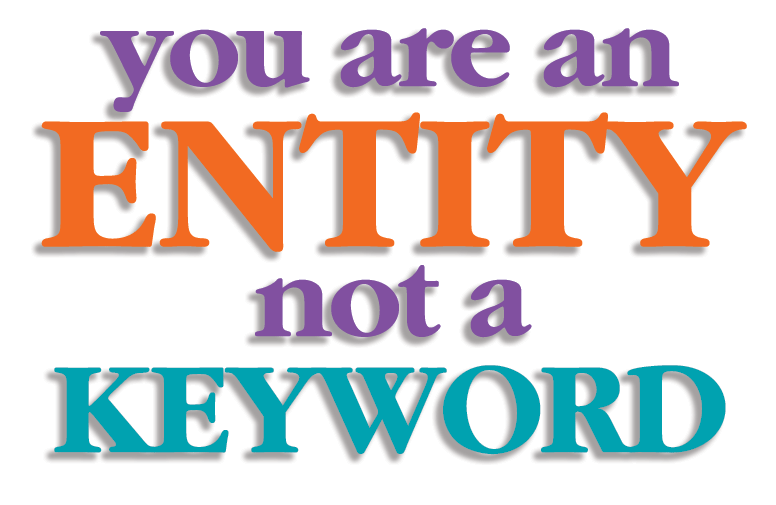Is Your Website a Secret Island?

An Oceanic Journey — the Spread of Your Influence
“If we visualize the Web as a sea, then the technology is ships and the websites are islands.”
“The early days of the Web were the age of sail when the technology we had was fairly inert and websites were static concerns that put all their energy just into being.”
The Secret to Making Your Business Successful Online

How do you go from being a great baker and shopkeeper to making a great and growing business online?
In your shop the bread and pastries you baked were very popular. Your customers loved them. You loved your customers, too. When the people you knew came in to pick up their pastries, you enjoyed talking with them. They respected you. They trusted you. They told their friends about you.
You also knew what they wanted. You learned when they wanted bread and when they wanted desserts. You knew what they most enjoyed for breakfast pastry and you listened when they told you about their needs and interests. That was the key to your success. You listened. They trusted you. And you made exactly what they wanted. But, it was time to grow a larger business. Can you do the same thing online?
Social Media for Semantic Search Success
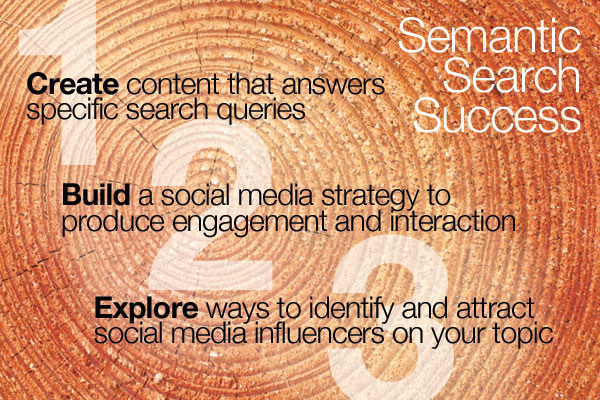
"Website content that cannot be readily and willingly created, shared, commented on, and reshared by real people, is, in Google's eyes, of scant real value and eventually will have no place on the search results pages."— David Amerland, Google Semantic Search
The expectation is that, if Google has understood your query correctly, and positioned high quality answers on the search page for you to find, you will find answers and your search will be satisfied. Then you need no longer search; the task is done. But with all the noise online, like going into a room where everyone is talking loudly, this is extremely complex. The search engine needs to understand the meaning of the words in the query and the meaning of the words in the web post in order to match them accurately. How does Google understand and identify valuable content on the web? How do you plan your website to fulfill the needs for high ranking?
Remember the "One-Hit-Wonder"?
Content Strategy and Semantic Search Solve That Problem!
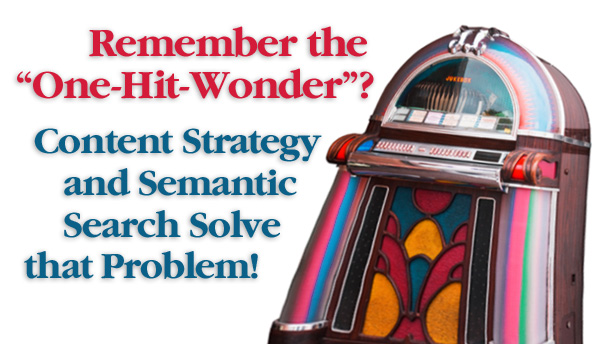
“Next up, a ‘One-Hit-Wonder’,” raves the radio announcer. You sit up, perk up your ears, and smile as you recall that old song you once loved. This may be a melancholy memory for those who border now on ancient, like me, but I do hear them each week on “60’s on 6” with “Uncle Brucie”, the “SeriusXM” channel that dominates the air waves in my VW Beetle.
One often wonders, what did happen to that group? Now, the Beatles, they lasted beyond crying out “I Wanna Hold Your Hand.” I saw them in Shea Stadium at age 13 and still can’t stop singing their music, from “Abbey Road” to “Yellow Submarine” to my namesake, “Sgt. Pepper’s Lonely Heart’s Club Band” at the ripe old age of 63. We continue to sing, “Imagine, there’s no heaven . . .” by John Lennon. “You may say I’m a dreamer, but I’m not the only one.” Why? They captured our imaginations, our hearts, and they were everywhere. Every year, every month for a long time, every performance, with new content, new tunes!
The music world, like the print publishing world, thrives on continuous new work. A Nobel Prize novel is wonderful, but must be followed by new books next month and every month from the publisher. Or else, they are a one-hit-wonder. The need now is to build brand equity through a constant stream of new content products and share them through ever-changing new channels of communication.
Dressing Your ENTITY for Success

“You may send a wrong signal. You may, for instance, turn up at a white-tie function wearing shorts and a t-shirt”, says David Amerland, as he provides an analogy to establishing trust online in his module 5 video lesson about “Google Semantic Search” from “Plus Your Business.” If you do this, he suggests, you will need to work harder to establish trust now that you sent out the wrong signals.
When you want to build up your brand or your business online, you may indeed find yourself accidentally walking into the room dressed inappropriately for the event. In other words, showing up to post something that is so out of your professional character that you blow potential colleagues or clients away. I'm sure I have done this. Most people probably have. But as we build our professional credit up here, we need to begin being more conscious of the way we present ourselves as professionals. It is not just a social journey if you want to build a business, yet it is essential to be real, to be transparent, to be ourselves. How do we negotiate the system correctly?
Why Would Google Recommend You?

Have you ever gotten a request for a recommendation? So often you don’t really know the person well at all, and if you agree to help them, there you are trying to figure out something to say. It doesn’t work. It’s not genuine. Why would it be different for Google?
Did you ever recommend a store without trying its products? Well maybe, if a good friend you trusted suggested it. Is there any time that we recommend something in good faith that we know nothing about? Not really.
Doesn’t Google need to know something about you or your website content so it can rank it on a search page? Have you thought about this — that each site showing on the page is actually a recommendation? Each time you type in a search box, this is a request to Google for a recommendation of content that will be a solution for your need. Why would Google do this without knowing you and your content?
Are You Actively Building Your ONLINE Reputation?

How do you trust?
We are talking about trust. Trust online. Trust offline. How do you build trust in a person? How do you build trust in a business? You do something to interact with them. You try them out. If you are with them and can see them, you have many signals to use to determine if they are honest or trustworthy. If you are dealing with a business, you shop there, and if your experience is good and the product is good, then it works out well. Trust is based on direct experience.
What if you have no direct experience with the person or with the business you seek to trust? What are the signals you check out? Usually it is something or someone that validates their reputation for you. You trust a third party to suggest or recommend someone. (Think of a blind date here.) Sometimes it is not a very accurate system. For a store online, you might check them out on any number of online websites. How many recommendations do they have? What about social media "likes" . . . are they an accurate trust recommendation?
Local Landscaper Semantic Search Success Story!
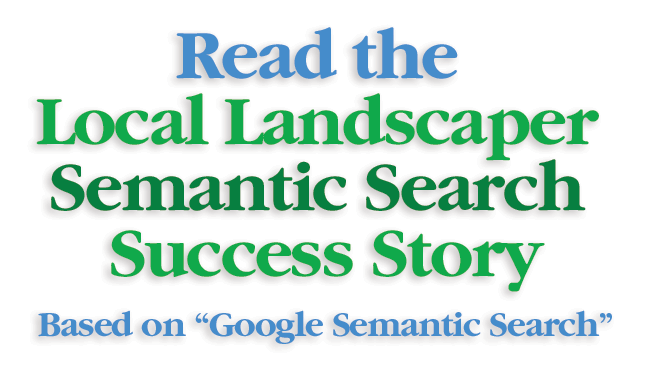
Fictional story of the Organic Landscaper who used Semantic Search to build Success
This landscaper realized the importance of excellent customer service, and providing a web savvy communication system. As a result of his efforts, he had many customers wanting him to handle their lawns. One step at a time, the landscaper realized that making each lawn beautiful was just a part of the role he played.
The people became excited about supporting his business when he also helped to beautify the town public spaces. Their regular referral of his work and his service activities to their friends made him increasingly more popular. The power of these customer relationships enabled him to soon edge out his competition.
There were many landscapers in this town, but he had done something to earn the hearts of the people and he had more friends and customers than he ever imagined as a result. It was his passion to truly serve the community in which he and his family lived. Follow the steps he took to use some good semantic search advice and make it work.
Based on the popular book, Google Semantic Search, by David Amerland, this fictional story of a landscaper who did everything right is another example provided as a creative model for small business.
Passion & Customer Relationships Win at SEO

Are you passionate about what you do in your small business?
Do you obtain only the finest ingredients?
Do you provide an outstanding service people love?
Is there a story behind the success of your business?
How can you Win at SEO in new ways?
What on Earth is a Knowledge Graph?
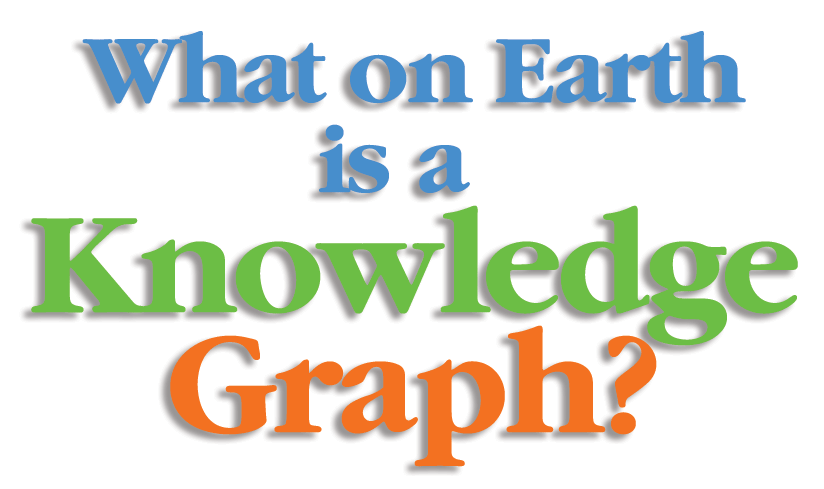
Semantic search is powered by the “Knowledge Graph”, explains David Amerland, in his groundbreaking book on SEO, “Google Semantic Search”. What on earth is the "Knowledge Graph"?
First, you need to understand that Google is a knowledge engine more than a search engine. It is about the business of gaining knowledge of “entities” and then compiling this knowledge so that it can match up entities better.
Were you a "Trekkie" like me? The captain in that television show talked to the computer much like it was a staff member, by voice only. Did you ever see anyone typing the word “Engage” as the vessel took off at light speed? That world is where we are headed now. "Beam me up!"
You are an ENTITY not a KEYWORD
Last year your business was just a keyword to the search engine.
This year you are an "entity". You have stepped up in the world. This is in the mind of Google Search. Last year search processed keywords and matching keywords tended to identify the search page where you or your business website would be found.
This was a big deal and people in the search engine business would work very hard to see that you placed in all the right pages for your keywords. Keywords were king! Not so anymore. In the summer of 2013 the Google search engine was replaced with a new one called "Hummingbird". This was not a superficial change as they have done many times in the past with updates. This was a profound change in the way the search engine thinks.
The Hummingbird engine understands word meanings, semantics, and now processes people, places and things as "entities" with relationships. This comes closer to the real thinking computers of science fiction in our minds. It can process relationships between entities as well as qualities of an entity. Learn how this affects your business now!
But I don't Have TIME for Social Media
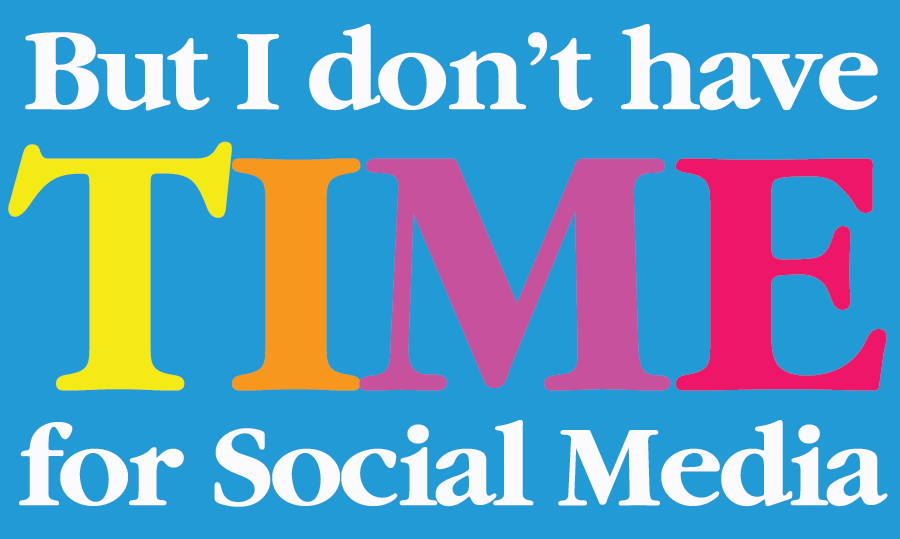 You don't have time not to do social media.
You don't have time not to do social media.
"Let's talk about time. I want to find you just two hours a week to start with."
"Two hours? Why?" asked my client.
"Is there anything you do in your work week that does not give you results, is a waste of your time?" I asked.
"What do you mean? I am the manager here, I have to do all my tasks. There is nothing extra. This is what I do."
"Ok, then, let's list a dozen main functions you perform during your work week and put approximate times to them." We did.
"Is there any one of these that someone else could do? Your pay level is much higher. Could you hire someone who is paid less than you to do one of these tasks?"
Ever Been First to the Party?

You know how it feels. Empty room. No one there yet. You thought you would see your friends. You feel embarrased and you want to leave. It did not occur to you that you were supposed to fill the room.
This is how many people feel when they start their Google+ page. Their friends are "on Facebook" and there is no one they know on Google+, empty circles. We don't come here to do the work ourselves, to find people ourselves. But its easy, give it a try.
I'm Not Afraid of No G+hosts!
(cue theme from Ghostbusters™)
 In its infancy, two years ago, people called Google+ a ghost town. But infants grow up. We don't know what they will be as they grow. I think in the world of existing social media people are caught in that mental framework and think something new is just another one of the same. They compare apples to apples. I like apples. I prefer apples actually. But this is more like mango, sweet and fresh when opened.
In its infancy, two years ago, people called Google+ a ghost town. But infants grow up. We don't know what they will be as they grow. I think in the world of existing social media people are caught in that mental framework and think something new is just another one of the same. They compare apples to apples. I like apples. I prefer apples actually. But this is more like mango, sweet and fresh when opened.
Beam me Up! I've Been Assimilated!
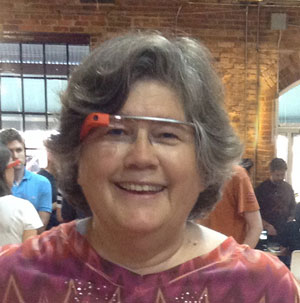 My first question, as I went to the Google Glass event, was whether I could wear them with my glasses. The invitation said to wear contacts and explained that they could not promise you could see with eyeglasses. I arrived at Bay7 in downtown Durham with curiosity and was totally surprised to find out they worked fine with glasses! I posted a photo on Google+ and a friend said, looks like the Borg assimilated you . . . (from Star Trek). Of course! Happily assimilated, I will tell you what I learned about these things.
My first question, as I went to the Google Glass event, was whether I could wear them with my glasses. The invitation said to wear contacts and explained that they could not promise you could see with eyeglasses. I arrived at Bay7 in downtown Durham with curiosity and was totally surprised to find out they worked fine with glasses! I posted a photo on Google+ and a friend said, looks like the Borg assimilated you . . . (from Star Trek). Of course! Happily assimilated, I will tell you what I learned about these things.
Make New Friends, But Keep the Old
Choosing Between Facebook and Google+
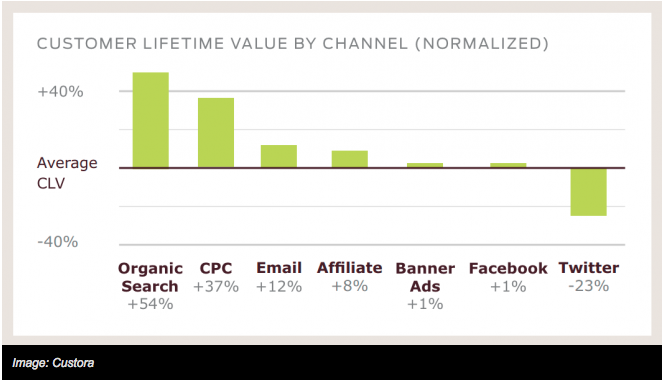
This is a familiar phrase of a song we sang in Girl Scouts. Why is it pertinent here in an article on business marketing and Google+? Because Google+ is the way to make new friends and Facebook is a way to keep the old.
Your Desktop is Now Just Another "Device" like a Tablet, but Bigger

Can you remember, back before the computer was the main item on our workdesks, and sending an "email" was a new thing you weren't quite sure about? It wasn't that long ago.
I thought about that today as I was listening to a webinar about "responsive web design." That term means to design your internet communication to respond to any size or shape device the human is using to see or read it.
Worried About Making Your Website Responsive (for Tablets & Phones)?

Here are a few simple steps to guide your thinking about this recent switch to tablets and phones. Do you need to change your website? What do you do first?
If you have attached Google Analytics to your website, then go to your analytics results and check about devices. Select Audiences > Select Mobile > Select Devices. You can see how many visitors are coming to you from a device such as a phone or tablet. If you don't have Google analytics set up, then that would be your first step. Go to Google.com and add analytics first.
Strategic Planning for Website Content
Most people say to me they want a basic website. It consists of a homepage, one or two theme content pages, a services page, a resources page, then an about page and contact page. This may seem fairly normal, but the problem is that it is from the website owner's perspective. The visitor's perspective may be very different.


